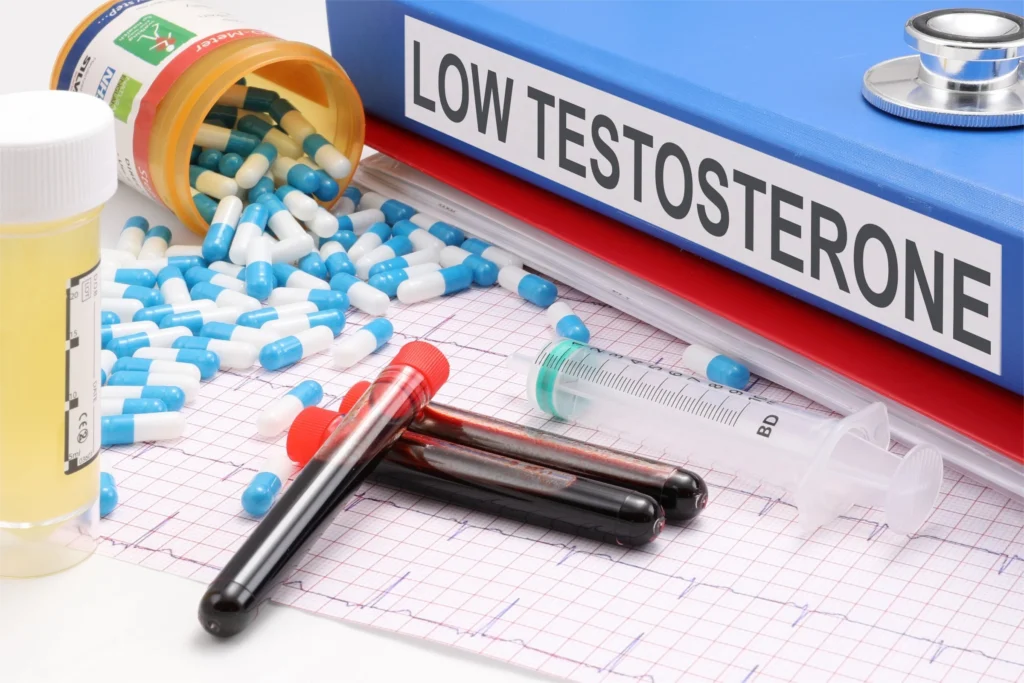
Recently feeling a little off? Perhaps you’re feeling lethargic, agitated, or just uninspired. If so, you may want to think about taking a testosterone test. One hormone that is essential to men’s health and wellbeing is testosterone. It can cause a range of symptoms when low.
We’ll examine the ten most typical indicators that your testosterone levels may be dropping in this post. Let’s quickly review what testosterone is and why it’s so crucial before we go into that.
What is Testosterone
Men’s testes are the main organs that produce the steroid hormone testosterone. It is in charge of several crucial processes, such as:
Muscle growth and development: Testosterone aids in the development and maintenance of muscular mass. Strong bones require a certain level of bone density.
Sex drive: The hormone testosterone is essential for both sexual function and desire.
Mood: Depressive, irritable, and low-energy symptoms can all be attributed to insufficient testosterone.
Red blood cell production: Testosterone plays a role in controlling the synthesis of red blood cells, which are responsible for distributing oxygen throughout the body.
Men’s testosterone levels naturally drop with age. Still, some men might feel a bigger decline than others. Numerous things, such as health issues, lifestyle decisions, and specific drugs, may be to blame for this.
What Makes Testosterone Vital?
For males to be healthy and happy overall, testosterone is necessary. It facilitates:
Preserve muscle mass: Men typically lose muscular mass as they become older. This loss can be avoided in part by testosterone.
Boost bone density: Testosterone contributes to the health and strength of bones.
Boost your sex drive: Testosterone is necessary for both sexual function and desire.
Boost mood: Depression, impatience, and low energy can all be caused by insufficient testosterone.
Boost your energy levels: Testosterone controls how energy is metabolized.
10 Indications That Your Level of Testosterone Is Too Low
Your testosterone levels may be low if you’re exhibiting any of the following symptoms:
Fatigue: Despite getting enough sleep, do you always feel exhausted? This can indicate low testosterone.
Reduced sex drive: Low testosterone may be the cause of any decrease in sex drive you’ve seen.
Erectile dysfunction: Low testosterone can cause problems getting or keeping an erection.
Loss of muscle mass: Even if you exercise frequently, if you’re losing muscle mass, it may indicate low testosterone.
Mood swings: Do you feel nervous, depressed, or irritated? Mood disorders may be exacerbated by low testosterone.
Weight gain: Even if you’re not eating more calories, low testosterone may be the reason for your weight gain.
Hair loss: In some men, hair loss may be a sign of low testosterone.
Diminished energy: Do you feel unmotivated and lethargic? Low testosterone might be the cause of decreased energy.
Hot flashes: Men with low testosterone can also experience hot flashes, however they are more commonly associated with menopause in women.
Difficulty concentrating: Your inability to concentrate and focus could be the result of low testosterone.
Reasons Behind Low Testosterone
Low testosterone may have a variety of reasons, such as:
Aging: As men get older, their testosterone levels gradually drop.
Obesity: Excessive weight or fat might cause testosterone levels to drop.
Certain medical conditions: Type 2 diabetes, hypogonadism, and sleep apnea are among the illnesses that might impact the production of testosterone.
Medication: A few drugs have the potential to disrupt the production of testosterone.
Stress: Prolonged stress has been shown to reduce testosterone.
Testicular injury: Trauma to the testes can harm the cells that generate testosterone.
The low testosterone diagnosis
Your doctor may probably request a blood test to check your testosterone levels if you’re exhibiting low testosterone symptoms. In certain situations, more testing might be required to rule out alternative explanations for your symptoms.
Therapy for Deficient Testosterone
If your physician determines that you have low testosterone, you have a number of alternatives for treatment. These could consist of:
Lifestyle modifications: Modifying your way of life to include regular exercise, stress reduction, weight loss, and physical activity can raise your testosterone levels.
Medication: Medication is one treatment option for low testosterone in certain situations.
Testosterone replacement therapy (TRT): TRT is the process of replacing the body’s natural testosterone production with synthetic testosterone.
FAQs
Q: What are some of the most prevalent symptoms of low testosterone?
A: The most frequent symptoms of low testosterone include exhaustion, reduced sex desire, erectile dysfunction, muscle loss, mood changes, weight gain, hair loss, poor energy, hot flashes, and problems focusing.
Q: What causes low testosterone?
A: Low testosterone can be caused by aging, obesity, certain medical disorders, drugs, stress, or testicular injury.
Q: How do you identify low testosterone?
A: Low testosterone is detected via a blood test to determine testosterone levels.
Q: What are the possibilities for treating low testosterone?
A: Low testosterone can be treated with lifestyle modifications, medicines, or testosterone replacement therapy.
Q: Will low testosterone effect my fertility?
A: Yes, low testosterone levels can impair fertility. It may impair sperm production and motility.
Q: When should I visit a doctor about my low testosterone?
A: If you have any of the signs of low testosterone, visit a doctor.
Conclusion
If you’ve been feeling weird recently, it’s conceivable that you have low testosterone levels. Understanding the symptoms of low testosterone and taking efforts to treat them can help you improve your overall health and well-being. Remember that it’s never too late to take charge of your health.